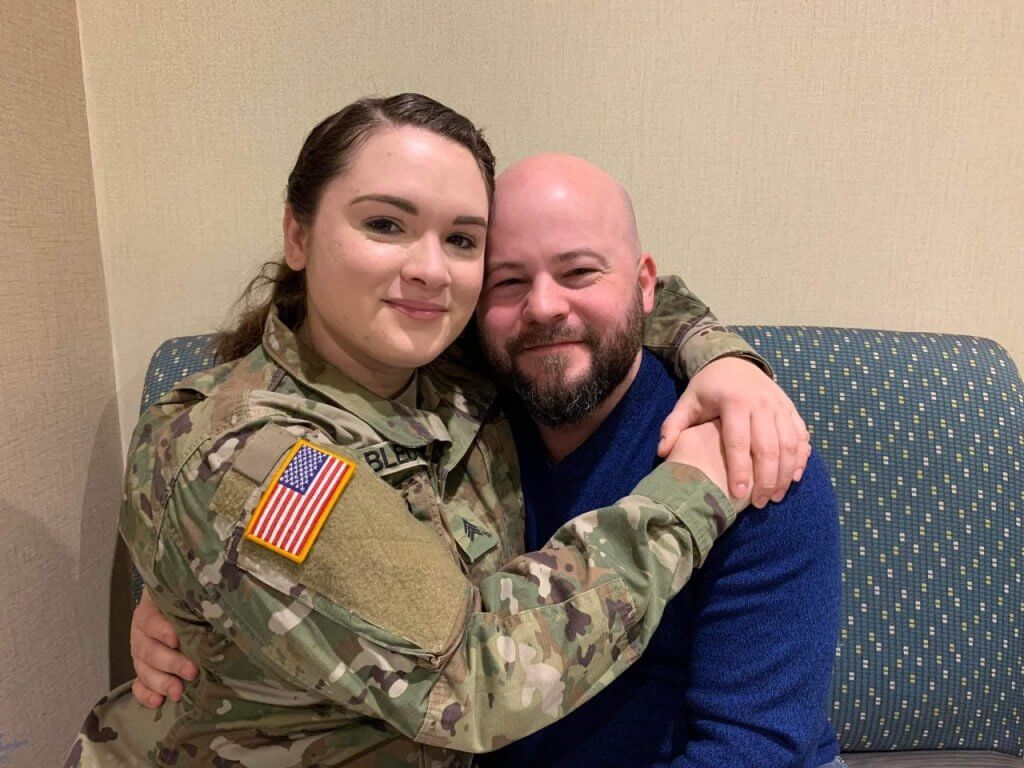Martin and Mikayla Bledsaw have faced several separation periods over the course of their 10-year relationship through college and career paths, including Mikayla’s training for the Army four years ago. But it wasn’t until January that they had to prepare for an entire year apart.
“I had to drop her off at Fort Leavenworth,” Martin said via email. “At that moment the only thought running through my mind when we last hugged and kissed was, ‘Come back safe.’”
Mikayla, a sergeant in the Army National Guard, was set to deploy to the Middle East with the 35th Infantry Division out of Kansas, presenting a new challenge in their relationship.
“To keep me from thinking about how sad I was, I had to remind myself that everyone around me was going through the same thing as well,” Mikayla said. “Since I am a NCO, I needed to be strong and be there for my fellow soldiers. I did not allow myself much time to think about being away from my husband at that point.”
Martin is among more than 130,000, or nearly 35%, of Reserve Component spouses, according to the 2020 Demographics Profile of the Military Community.
Staying strong amid deployment
A few weeks into the deployment, the couple’s schedules are still getting figured out as Mikayla gets settled overseas, but both Martin and Mikayla remind one another how to stay motivated and strong for the year ahead.
“Predictors of Spousal Support for a Member to Stay on Active Duty,” a 2019 survey note from the Office of People Analytics, found that “long deployments and multiple PCS moves are related to decreased spousal support to stay in the military,” but also that social support leads to a spouse being supportive of continued military service.
“Based on these results, spouses who have a connection to the institution, high family functioning and better financial condition have greater odds of support for their service member to stay in the military,” the note stated. “However, when the opposite is true … and there are difficulties with military life (e.g., long deployments and many nights away from home), the odds of spousal support to stay in the military decrease.”
Martin said becoming a recluse during the deployment is not an option and both should find new activities – start a new hobby, workout regimen, watch new shows, try new food. When your soldier returns home, both will have new experiences to share with one another, he said.
‘Distance can’t diminish my love for her’
Communication is critical, according to Mikayla, especially when it comes to keeping loved ones in the loop. She also said to keep in mind what can go wrong at home – not to cause either partner unnecessary stress or worry, but to prevent it.
Both agreed that sending messages to one another, even when they’re not available to talk, is key.
“My husband also sends me pictures and videos of himself with our cats and that always brightens my day,” Mikayla said. “Whenever I miss him, I go back and watch the videos he sends.”
It’s the little things that matter most and will make them stronger in the end.
“We have been through a lot of tough times together,” Martin said. “I don’t know if my love for her will become stronger – it’s as strong as it’s been since the day I told her, ‘I love you.’ Distance can’t diminish my love for her.”
The Bledsaws both are confident in their relationship, Mikayla said.
“I know that my husband is strong and resilient, and I know that he believes me to be the same,” she said. “I think that our love will become stronger from this.”
The time apart also lets them step back and look at the relationship from a new perspective.
“Sometimes when you are around each other all the time, you don’t realize all the little things that your partner does for you,” she said. “When you are away it becomes very clear and makes you appreciate your partner and life more.”

